Small Businesses Increasingly Turn to Cloud for Storage – Clutch
Over 4 out of 5 paying for that, 38% between $51-$250/month
This is a Press Release edited by StorageNewsletter.com on February 13, 2018 at 2:27 pm This survey was written by Riley Panko, senior content developer and marketer, Clutch, a B2B research firm, on February 07, 2018
This survey was written by Riley Panko, senior content developer and marketer, Clutch, a B2B research firm, on February 07, 2018
What Cloud Storage Providers Offer Small Businesses
Small businesses are heavily influenced by available features and security when selecting their cloud storage provider, according to a survey of 300 U.S. small businesses.
Small businesses increasingly turn to the cloud for their storage. The cloud typically offers more cost-effective and secure storage than an on-premise solution, especially for businesses with small budgets and few employees.
How do small businesses select the best cloud storage provider for their needs, though?
Clutch surveyed 300 IT decision makers at U.S. small businesses that use cloud storage to determine how they selected their provider and how they regularly use their cloud storage.
For small businesses, our data gives insight into what to look for when shopping for a cloud storage provider.
For cloud storage providers, this report highlights what to showcase about your tool when marketing to small businesses.
Our Findings
• The majority of small businesses that use cloud storage (63%) began in 2015 or earlier, but cloud storage usage continues to grow.
• The largest percentage of small businesses (35%) say that features or capabilities primarily influenced their decision to invest in their current cloud storage provider.
• The largest percentage of small businesses (29%) say that access to data is the primary benefit of using cloud storage.
• Over 4 out of 5 small businesses (81%) pay for their cloud storage, an increase of 10% over the last 3 years.
• Over 4 in 10 small businesses (42%) using iCloud reported downtime or limited access in the past 12 months, compared to 33% of small businesses overall.
Cloud Storage Is Becoming Ubiquitous
Cloud storage usage continues to grow.
Our research from 2015 found that 52% of small businesses used cloud storage. The latest data shows that 37% of small businesses using cloud storage adopted the technology in 2016 or 2017.
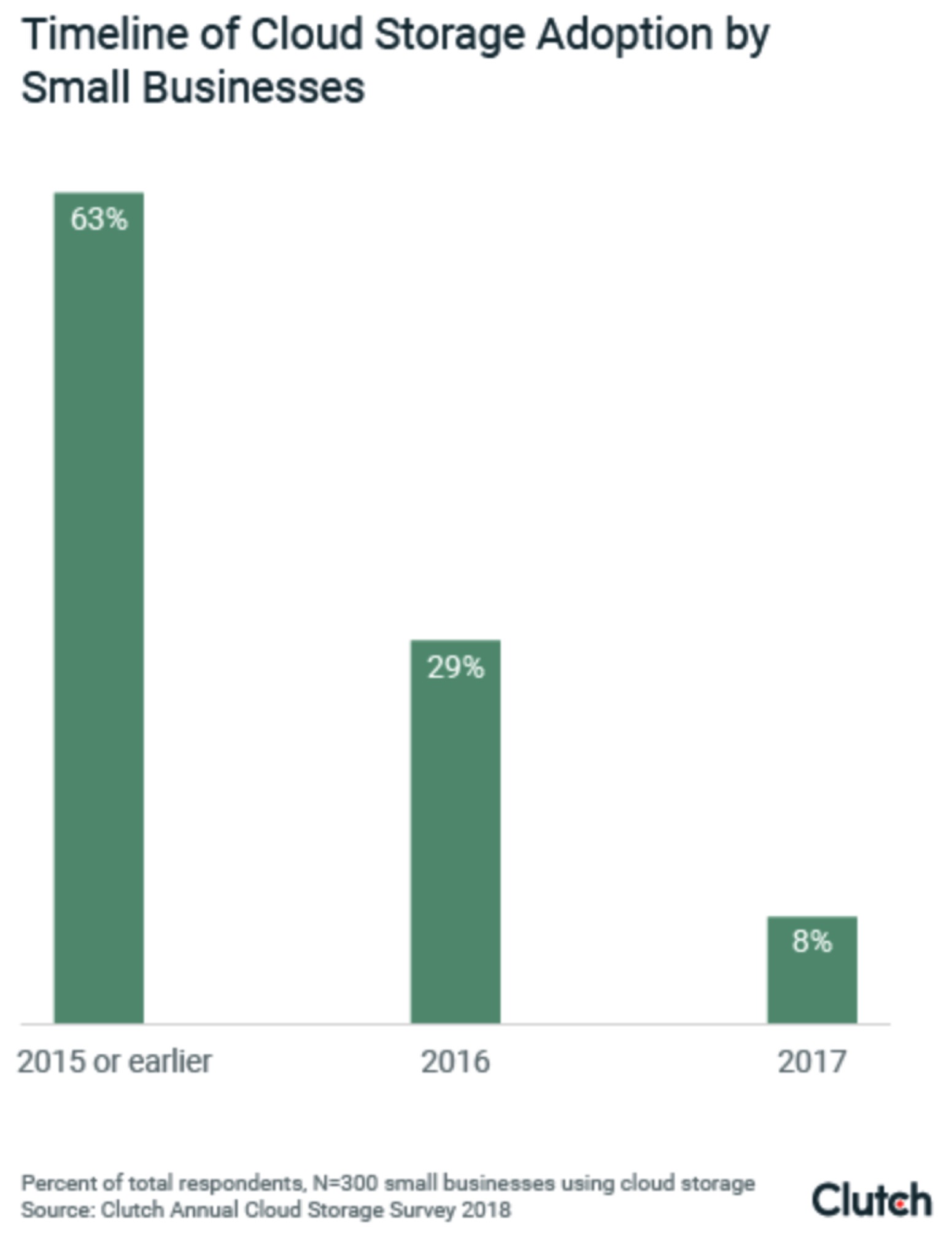
As the cloud becomes more accepted in our daily digital lives, more small businesses are drawn to cloud storage’s benefits.
Ghazanfar Ghori, CTO of 10Pearls, a software development and end-to-end digital services company, discussed the cloud’s broad suitability for businesses.
“I think it makes a lot of sense [for small businesses] to leverage [cloud storage] because it’s not just one less thing you have to worry about – it’s 10 fewer things,” said Ghori.
Ghori cautioned that cloud storage may not be a good fit for businesses with ‘tremendous’ amounts of data, or data requiring heavy analysis. However, for other businesses, cloud storage usually works well and can help alleviate the stress of storage, making it simpler and more secure.
Cloud Storage Features and Capabilities Attract Small Businesses
Small businesses look most at features and capabilities when they shop for a cloud storage provider.
Over one-third of small businesses (35%) said that features and capabilities primarily influenced their decision to invest in their current cloud storage provider.
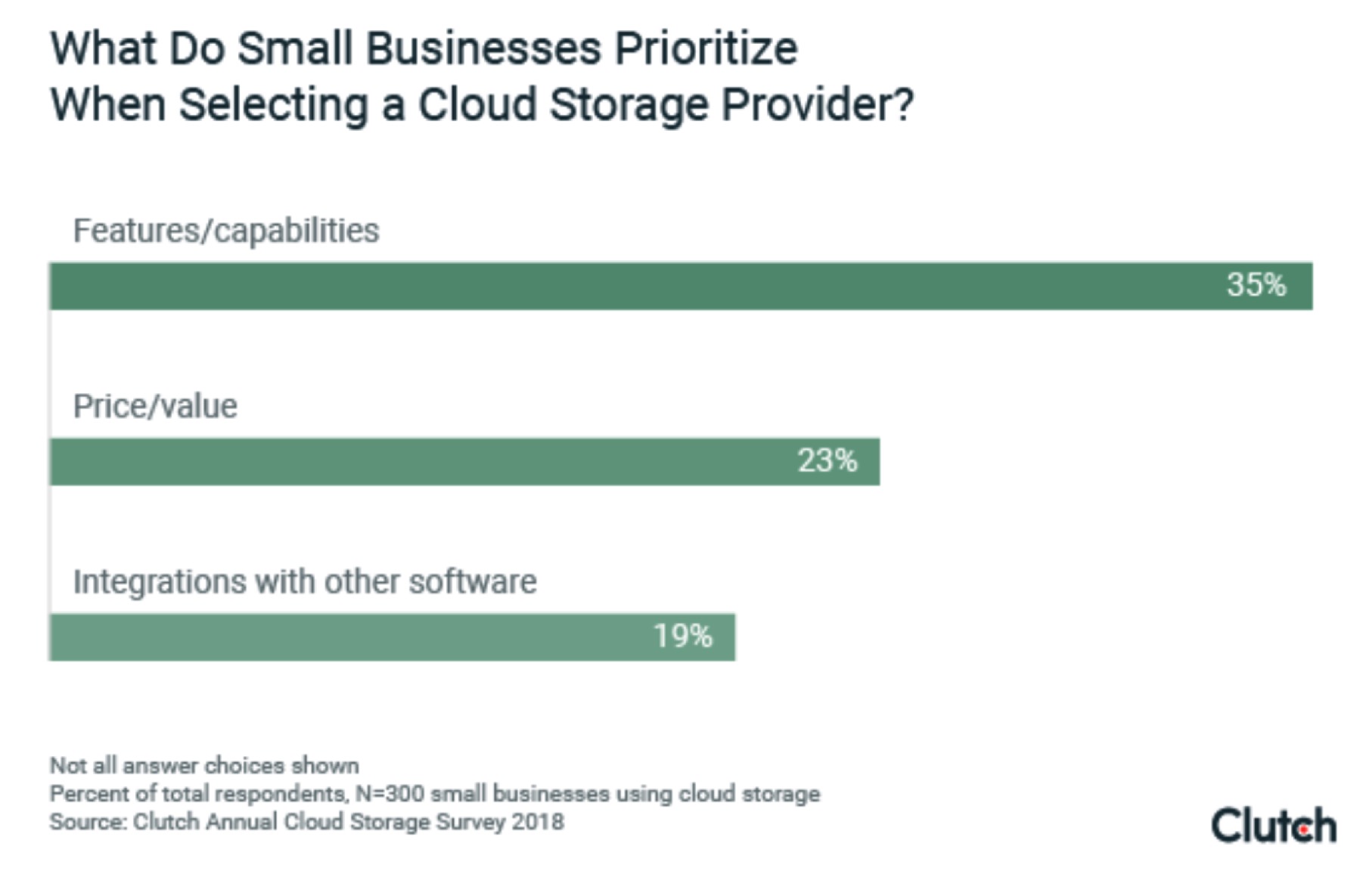
Examples of cloud storage features include:
• Remote access: ability to access data from anywhere
• Automatic syncing: ability to automatically upload new data to the cloud
• Flexible storage space: ability to easily increase and decrease storage space as needed
This emphasis on features breaks from past opinions of cloud storage.
“[The influence of features and capabilities] is important because it’s evidence that businesses are looking at cloud storage not only to store their data but also to implement new services with it,” explained Sebastian Velez Ruiz, director of engineering, PSL, a software development company.
“Cloud adopters some years ago used the cloud only to provide increased availability to the information or as a backup mechanism when their data center failed. Now, cloud storage is beginning to focus on capabilities,” he continued.
Meanwhile, marketing tactics aren’t influential. Only 4% of respondents said free trials primarily influenced their buying decision, and 3% were influenced by online ratings and reviews.
Small Businesses Prioritize Security of Cloud Storage Providers
Small businesses prioritize security as the most important characteristic of a cloud storage buying decision.
Almost all small businesses (97%) said security was very or somewhat important to consider when picking their current cloud storage provider.
For small businesses with limited resources, storing data in the cloud potentially offers better security than their on-premise solution. Many features that would be difficult for small businesses to build in their on-premise solution, such as two-factor authentication, come ready to use with cloud storage providers.
“The integrated security features that come with cloud storage [are valuable], like two-factor authentication being offered out-of-the-box,” said Istvan Lam in our previous cloud storage security survey. He is CEO of Tresorit, an end-to-end encrypted cloud storage provider for businesses. “How would a small business set that up for their employees with their on-premise system?“
However, by storing data in the cloud, you may make your data more of a target. While hackers may not care to hack the data of one small business, they may care if your data is stored alongside the data of thousands of other businesses.
“The cloud can be a very good target for attackers, with the high density of confidential information in one place. It might not be worth it to attack a SMB, but a cloud storage provider storing millions of SMBs is a good target,” said Lam.
Be sure you select a cloud storage provider that is cognizant of and prepared for this possibility.
Cloud Storage Offers Better Access to Data for Small Businesses
Small businesses value access to data offered by cloud storage the most.
The largest percentage of small businesses (29%) selected ‘access to data’ when asked to select the primary benefit their business receives from using cloud storage.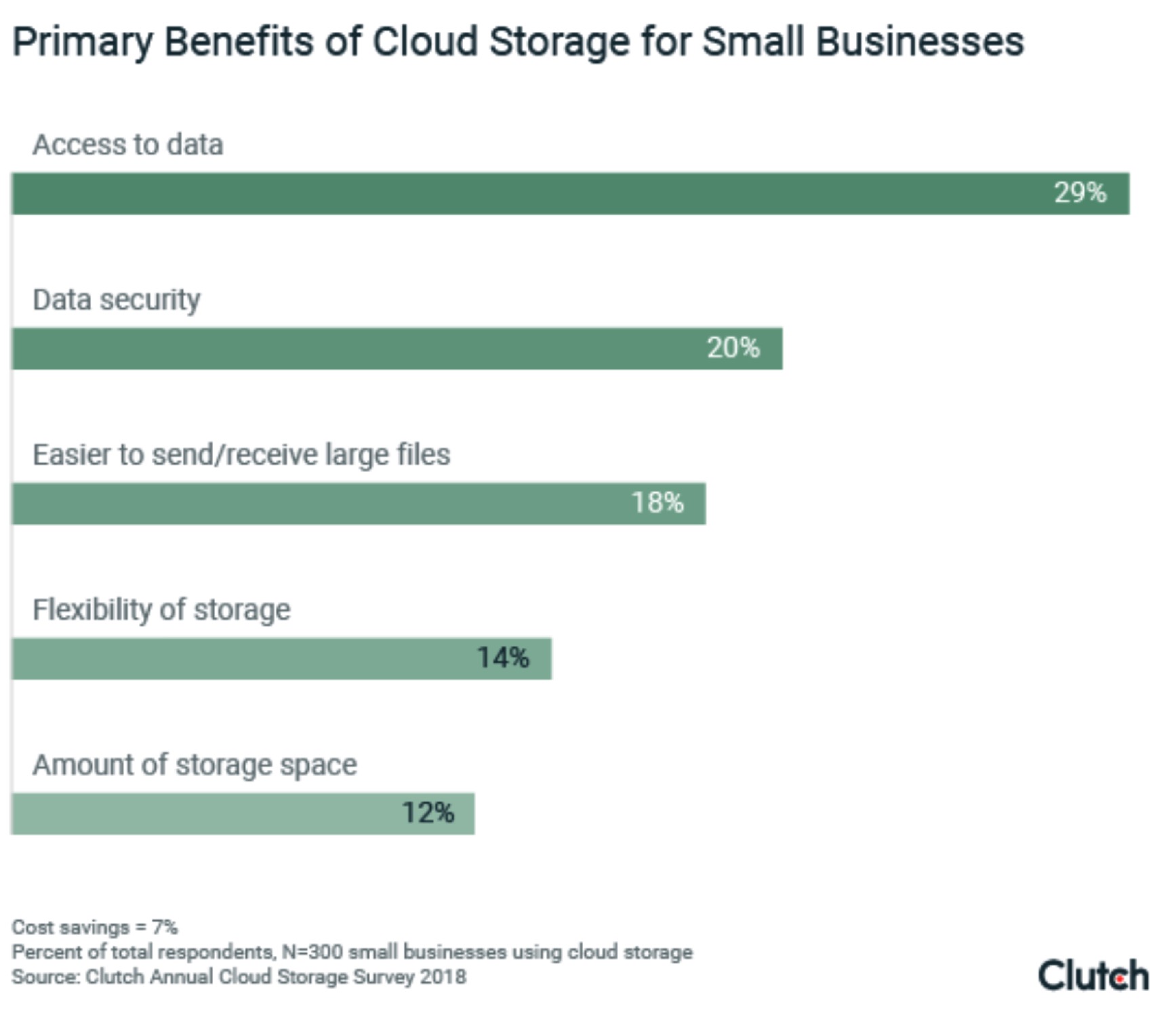
Velez said that businesses take advantage of data accessibility offered by cloud storage in two stages:
• To increase data reliability
• To increase incrase the value of data
1. Using Cloud Storage to Increase Data Reliability
Businesses first use cloud storage to increase the reliability and availability of their data.
“Creating the required infrastructure on your end in order to provide a reliable service is usually expensive, time-wise and cost-wise,” said Velez. “With the cloud, you can leverage affordable solutions, since you have vendors that offer you data centers around the world and data replication strategies with almost no development efforts on your end.“
Simple reliability is an obvious advantage of cloud storage, but it shouldn’t be the only benefit a business gains from using cloud storage.
2. Using Cloud Storage to Increase Value of Data
Businesses can take cloud storage adoption one step further by using the cloud’s processing power to gather new insights from data.
“The second stage of cloud storage adoption is leveraging cloud services to increase the value of your data – for instance, massively processing your information through big data techniques or connecting with machine learning services from cloud vendors in order to get new insights from your data,” said Velez.
Yet, not many businesses take advantage of these capabilities.
“I feel these services are one of the key benefits you can expect to receive by moving your data to the cloud, but it is clear that not all businesses are at this stage of adoption,” said Velez.
Small businesses may be using cloud storage simply as a more reliable storage space for data. However, cloud storage offers much more powerful capabilities.
More Small Businesses Pay for Cloud Storage
More small businesses now pay for their cloud storage provider. In 2016, 71% of small businesses said they paid for their cloud storage. In 2017, 81% paid.
The largest percentage of small businesses (38%) pay $51-$250 per month for their cloud storage provider.
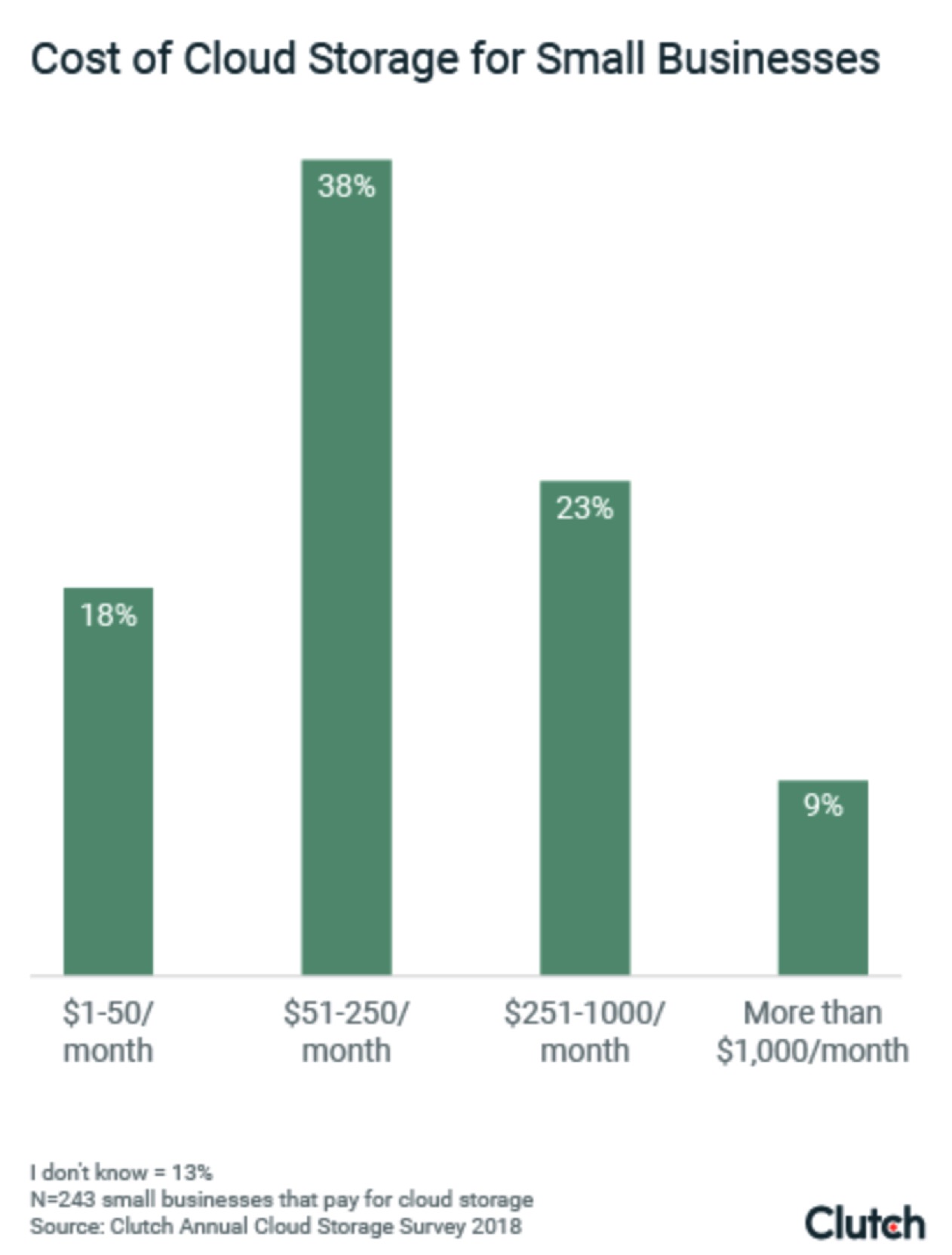
How much you pay for cloud storage depends on what you want to get out of it.
For example, experts emphasize the different benefits and costs of cloud storage and cloud backup.
If you need to access and collaborate on your data frequently, you’ll need a cloud storage solution that allows collaboration.
However, if your data simply needs to be archived and only rarely accessed, you can choose a low-cost and long-term cloud backup solution, such as Amazon Glacier or Google Coldline. These solutions are known as “cold” cloud storage. Since “cold” cloud storage requires little processing power, it is far cheaper.
“If you are looking between a backup solution or a collaboration solution, the collaboration solution is more expensive. The backup is cheaper,” explained Lam.
Almost 40% of small businesses use cloud storage for daily access files and backup equally.
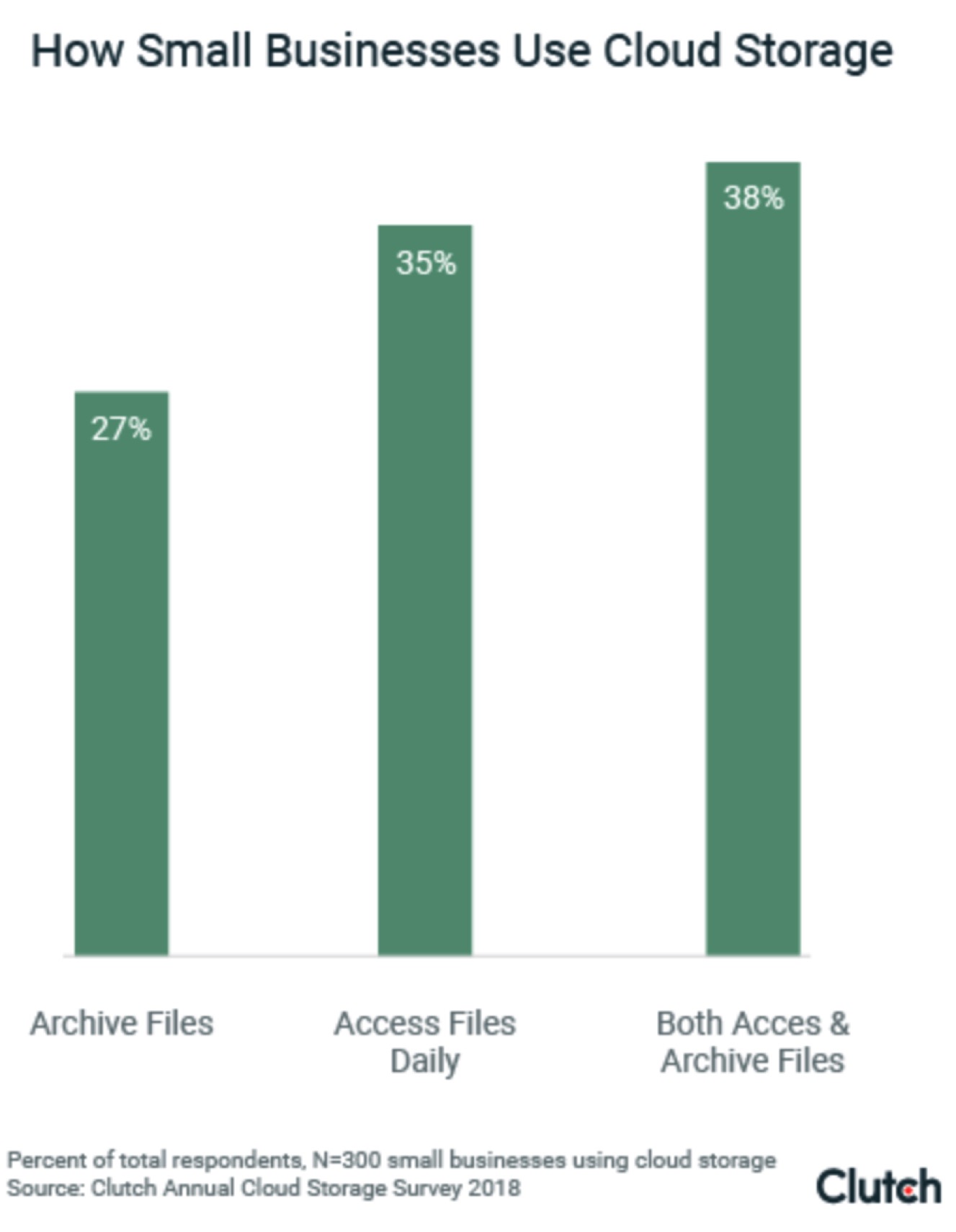
Small businesses may be able to save money by placing data that they don’t expect to access frequently in a long-term backup solution. For example, ‘cold’ cloud storage works well for industries that legally require long-term storage, such as the mortgage industry, said Ghori.
“For the mortgage industry, or any industry with regulations requiring you to keep copies of contracts for 60 years or 30 years – [Amazon] Glacier is a great option, as long as you trust Amazon not to go under,” he said.
Clearly understanding what you need out of your cloud storage may allow you to save money by exploring alternate options for different types of data.
Types of Cloud Storage Providers Differ in Issues
As with all technology, cloud storage providers will experience issues. However, understanding why issues arise and which providers more commonly experience them helps ease frustrations.
One-third of small businesses say they experienced downtime or limited access with their cloud storage provider in the past 12 months.
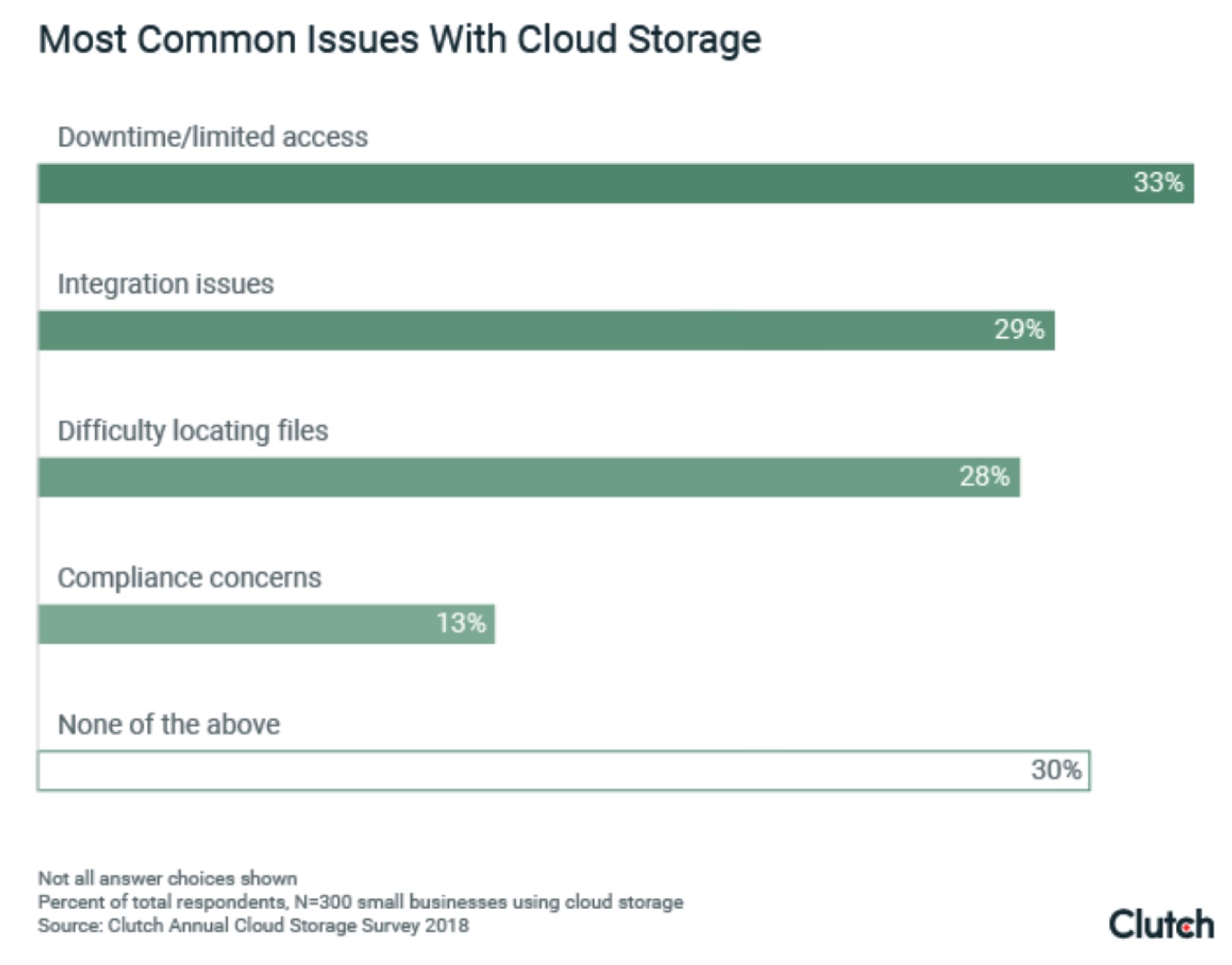
Lam said that some small businesses may be correlating connectivity issues with downtime.
He recommends offline syncing as a solution. This feature allows you to access and edit data regardless of Internet connection, and your cloud storage will update once you are online again.
“Even if you’re on a plane, you can work on the files and you synchronize once you’re back online,” he explained. “In this case, you don’t notice the service is down if you use a service like offline syncing.”
However, syncing cannot fix every instance of limited access: “If you need to download a file on the fly, then that’s different,” he said.
iCloud Experiences More Issues
Not all cloud storage providers are made equal.
A little under one-third of small businesses overall (30%) reported having no issues with their cloud storage provider in the past 12 months.
However, only 17% of small businesses who primarily use iCloud reported no issues, 13% less than the average. Meanwhile, 42% of small businesses primarily using Dropbox reported no issues in the past 12 months – 12% more than the average.
iCloud users most frequently reported the top cloud storage issue – downtime or limited access.
About 4 in 10 businesses (42%) said they experienced downtime or limited access with iCloud in the past 12 months.
Ghori said that iCloud is not an enterprise-grade service, meaning it cannot be scaled for a large organization. While small businesses may not necessarily require support for many users, enterprise-grade software often offers higher security and reliability.
Consider provider types and how they will best support your business when selecting a cloud storage brand.
Cloud Storage Offers New Features, Better Security, and Greater Access to Data
Small businesses don’t usually look first at low prices or free trials when selecting a cloud storage provider. Rather, small businesses are most influenced by the core elements of the technology – its features and capabilities – when they decide to invest in a particular cloud storage provider.
Furthermore, small businesses place emphasis on cloud storage security, and the cloud’s ability to offer flexible and fast access to data.
Yet, small businesses may not be using cloud storage most effectively in terms of cost or brands.
Businesses should place data that is infrequently accessed in a cheaper long-term backup solution. Furthermore, small businesses should ensure the brand of cloud storage they use offers the reliability and security they need.
About the Survey
Clutch surveyed 300 IT decision makers at U.S. small businesses that use cloud storage and have 2-500 employees. One in ten companies (10%) have 2-10 employees, 28% have 11-50 employees, 38% have 51-200 employees, and 24% have 201-500 employees. Responses are divided throughout the U.S. – Midwest (20%), Northeast (25%), South (32%), and West (23%) – and among male (61%) and female (39%) respondents.
Read also:
Majority of Small Businesses Don’t Necessarily Follow Mandatory Cloud Storage Security Regulations – Clutch
For storing credit card or medical information
2017.12.13 | Press Release
Five Steps to Select Cloud Storage Provider – Clutch
Most SMBs spend $51-250/month on cloud storage.
2016.12.13 | Press Release
Most US SMBs Prefer Both Online Or On-Site Backup for Data Protection – Clutch
In past two years, 63% adopted cloud-based backup solutions.
2016.06.21 | Press Release













 Subscribe to our free daily newsletter
Subscribe to our free daily newsletter

